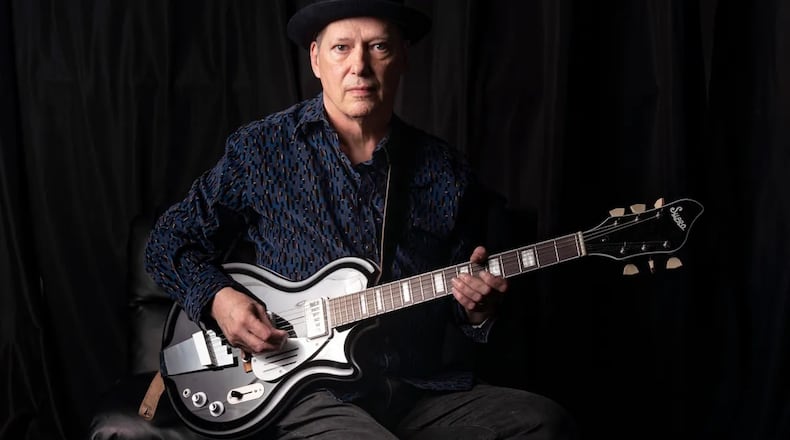Lloyd’s previous band, Television, helped shape the sound of the 1970s New York punk scene alongside bands like the Ramones and Talking Heads. The duel guitar interplay between Lloyd and the late Tom Verlaine, the band’s vocalist, was a defining characteristic of its sound. Television fused elements of avant-garde with art rock, blending melody with intricate solos, but was ultimately labeled as punk.
“Punk was a word that journalists happened upon,” Lloyd said. “They had been fishing for some kind of overarching descriptive word for this new music. Nobody was really doing that kind of thing at that time.”
A year after Television disbanded, Lloyd released “Alchemy,” his debut solo record. It was a poppier sound, but those Richard Lloyd guitar tones were still present. His solo career includes several more records and session work for artists like Matthew Sweet and John Doe (of the band X).
Now for a story.
Around 11 a.m. on a Thursday, my phone rang with a number with a New York area code. I answered the call while scrambling for my notes.
“Hello, this is Richard Lloyd,” he said. “I was told I’m supposed to call you. Who is this?”
I said who I was then asked if this was a good time to talk, as if he wasn’t the one calling me. I asked about the gig he played the night before in New Haven, CT, the first date on the fall tour, to stall before diving into the questions I’d prepared.
When Gwen Downing-Groth, the owner of Blind Rage, told me that Lloyd was playing the store I immediately thought he’d be a great interview subject. I imagined I’d ask him about Television, Verlaine, the New York punk scene, CBGB’s, his solo career and guitar techniques — as if he didn’t talk about all of those things in every interview he’d done since the release of “Marquee Moon.”
Once we were past the small talk phase, I consulted the first line of my notes: “ask him about Jimi Hendrix.”
Earlier this year, a story had surfaced about Lloyd being punched in the face by the guitar hero. Lloyd’s guitar-playing can also be tracked through the teachings of a fellow guitarist, who was ostensibly learning the way of the axe through Hendrix himself.
Surely he’d want to repeat those stories for a music writer in Dayton, Ohio.
But when I asked him about Hendrix, Lloyd said, “There’s nothing to be told. I mean, I wrote it in a little vignette in my autobiography.”
For the next 18 minutes I struggled to get the train back on the tracks, floundering with questions and non-sequitur ramblings about Stratocasters and Matthew Sweet. My nerves were shot, as if Richard Lloyd was on the other line.
It was a difficult conversation to navigate, if only because my list of pre-planned questions weren’t landing and I wasn’t prepared to improvise.
Nearly scaring this writer into another line of work, Lloyd began to open up when I asked him about starting his musical journey with the drums.
“One day the drums went from colorful to black and white,” he said. “I heard a little voice, you know, an audio hallucination, that said, You need to play a melody instrument. My cousins were beginning a rockabilly band, and they had a guitar. When they went to bed, I went into the bathroom and continued to play three chords all night long. There was nothing to stop me.”
I asked him if he thought starting with drums then switching to guitar primed him for his unique percussive style of playing. And while he didn’t disregard the theory entirely, he suggested that the guitar is also a percussive instrument since one hand percusses the strings.
Lloyd also revealed “the secret of the electric guitar,” the one that blues guitarist John Lee Hooker passed to him years ago.
“Learn on a single string,” he said. “Pretend the guitar is a sitar or some other single-note instrument. What I was advised is you bend the string, bend the note, as much as possible.”
As we were wrapping up, I unapologetically told Lloyd that I was distraught from the interview, just to clear the air. Humility is my coping mechanism.
And in that moment of vulnerability, Richard Lloyd told me not to be nervous. I found his consolation both hilarious and embarrassing, but I wear it as a badge of honor: a punk legend told me to do a better job.
Now I know to avoid boilerplate questions, to read autobiographies, to feign composure and to never ask about Jimi Hendrix.
Contact this contributing music writer at branberry100@gmail.com.
How to go
What: Richard Lloyd Group, with special guest Elite Terrorism Modulus
When: 7 p.m., Oct. 25
Where: Blind Rage Records, 740 Watervliet Ave., Dayton
Cost: $30-$40
Tickets: blindragerecords.limitedrun.com
About the Author



